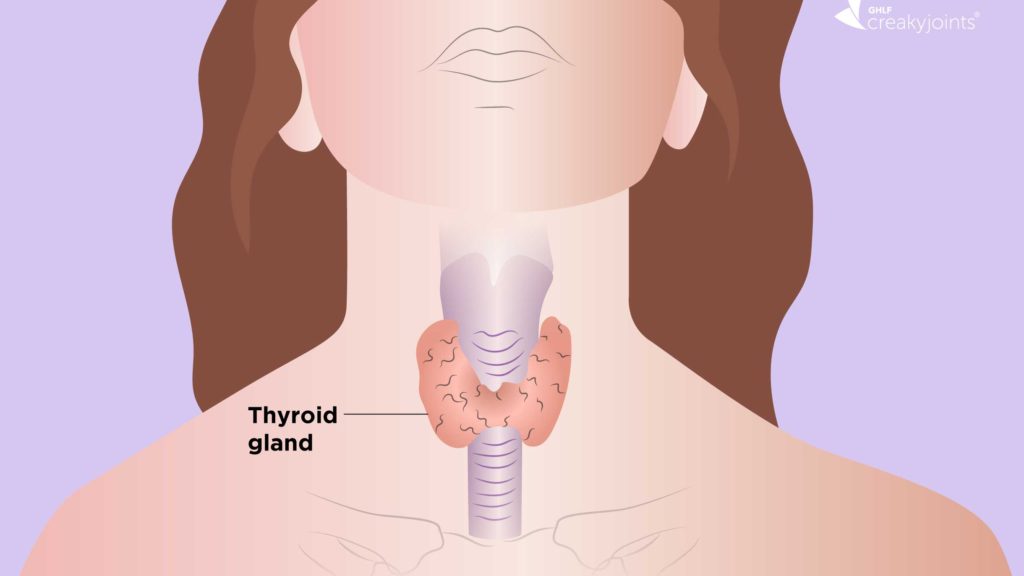
The thyroid is a tiny, bow-tie shaped gland found at the neck’s base just below Adam’s apple. The thyroid gland is only a part of an intricate network of glands of the endocrine system. The endocrine system co-ordinates many body activities to ensure all functions are done.
The parathyroid gland secretes parathyroid hormone (PTH) to balance calcium intake in the body. The thyroid gland takes iodine from your meal, converts it into thyroxine(T4) and triiodothyronine (T3) hormones and then, taken into the bloodstream.
The thyroid cells are the only ones that can absorb iodine in the body.These two cells combine amino acids tyrosine and iodine to make T3 and T4 hormones. The two hormones are then secreted into the bloodstream and transported to the body.
All body cells depend on thyroid hormones for the conversion of oxygen and calories to give energy. Because of the crucial role of controlling metabolism Thyroid Health becomes an aspect of great interest in promoting wellness.
The thyroid gland is controlled by the pituitary gland, a tiny-sized gland located at the base of the brain.
When there’s decreased thyroid level, the pituitary gland prompts the production of Thyroid-stimulating Hormone( TSH), which stimulates the parathyroid gland to produce the hormone TSH. E The surge of TSH causes the thyroid to manufacture and release T3 and T4 thus raising their blood level.
The pituitary gland senses this, and decreases TSH production. To better understand this relationship, take the thyroid gland as a heat source such as a furnace and the pituitary gland as a thermostat.
Thyroid hormones act like heat. When the heat hits the thermostat, it goes off. But as the room’s temperature cools down ( i.e. ,the thyroid hormone level drops), the thermostat restores its position( TSH hormone increases), and the source of heat produces more flame (thyroid hormones).
So what controls the pituitary gland? The hypothalamus regulates the pituitary gland. It produces TSH and prompts the pituitary gland to stimulate the thyroid gland to release TSH.
Is Thyroid Gland Important?
Triidothyroid (T3 ) and thyroxine (T4) travel through the bloodstream to reach all cells in the body. These hormones control and check the speed with which body metabolism operates.
For instance, T3 and T4 regulate a person’s heart rate and how fast the intestines process food. In case T3 and T4 levels are down, the heart rate may be slow thus, one can have constipation or weight gain.
If T3 and T4 levels are high, the heartbeat may be rapid, therefore, giving you diarrhea or weight loss.
Parathyroid Disorders
The parathyroid gland secretes PTH that balances calcium levels in the body. At times, these glands can produce more or little than the required amount of PTH hormones.
When the PTH levels are not in the required amounts, the body reacts. The common diseases associated with the thyroid gland are;
hypothyroidism and hyperthyroidism. This article will focus on the latter.
Hyperthyroidism
When the thyroid gland produces excess hormone, the calcium levels in the blood increase. The condition where there’s too much calcium in the blood is referred to as hypercalcemia.
Hypercalcemia makes one feel sickly though no symptom may be experienced. The symptoms of this disorder include:
- Muscle aches
- Increased urine volume
- Abdominal pain
- Increased thirst
- Constipation
- Mood swings
The diagnosis of hyperthyroidism takes months to be noticed because other causes of high calcium levels in the blood must be excluded.
The health care provider may decide to remove the overactive thyroid gland once it is established as the primary problem behind hypercalcemia.
High levels of thyroid hormone can remain unnoticed for a long time. If this happens, it may cause calcium from the bones to be absent in the urine and blood.
Eventually, the bones become thin and brittle. This condition is referred to as osteoporosis. Too much calcium present in the urine causes an accumulation of calcium and kidney stones.
Other symptoms of this condition are: excessive urination
- Bone and joint pain
- Loss of appetite
- Nausea
- Depression
- Frequent complain of illness
- Tiring easily
Hyperthyroidism can occur due to a problem with the thyroid gland or other diseases affecting the gland system.
Primary Thyroidism
Primary thyroidism occurs because one or more thyroid glands has a problem. The issue could be either of the following:
- A cancerous tumor
- A non-cancerous growth on any of the thyroid glands, a condition known as adenoma
- An enlargement of several thyroid glands, a condition referred to as hyperplasia
Primary hyperthyroidism is rare and those who get it could have had it inherited.
Secondary Hyperthyroidism
When calcium levels are lower because of other conditions, a person can suffer from secondary hyperthyroidism. The thyroid glands overwork to make up for calcium loss. Secondary thyroidism could be a result of:
Severe calcium deficiency-When the body does not get sufficient amounts of calcium from the diet, one may have low levels of calcium. This condition could be because the digestive system does not absorb calcium.
Severe deficiency of vitamin D-Vitamin D is a crucial mineral that helps maintain the required calcium level in the blood.
It’s also necessary for the digestive system to help absorb calcium nutrients from food. When one is exposed to sunlight, the body produces vitamin D. This complements the calcium from food.
Chronic kidney problems- The kidneys convert vitamin D into a usable form in the body. If the kidneys fail to work properly, calcium levels may decrease and cause the thyroid hormone to increase. Kidney failure is one of the causes of primary thyroidism.
Risk factors
Some people may be more prone to primary thyroidism than others. They include:
- Women beyond menopause
- Those with severe vitamin D deficiency
- Anyone with severe and prolonged calcium deficiency
- Those who have had radiation treatment around the neck area
- Anyone with bipolar disorder and uses drugs rich in lithium
- Those with inherited disorders such as endocrine neoplasia affecting the glands
The treatment given for hyperthyroidism destroys the thyroid gland or blocks it from releasing its hormones. The treatment could include antithyroid drugs, radioactive iodine pill, or a surgical procedure to remove the gland.








